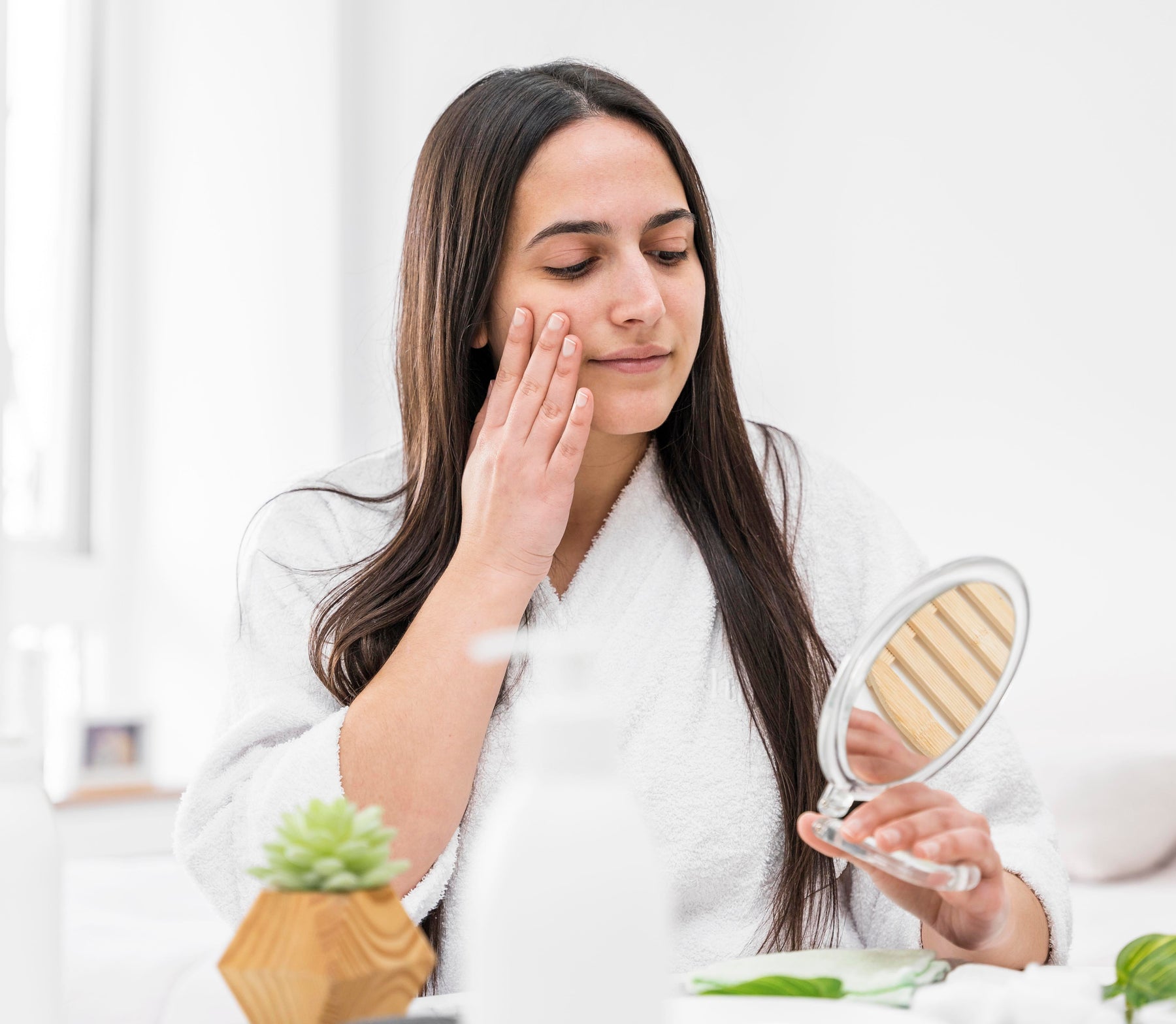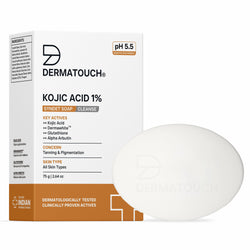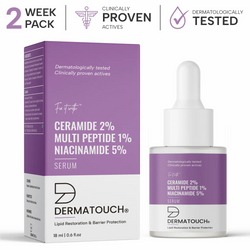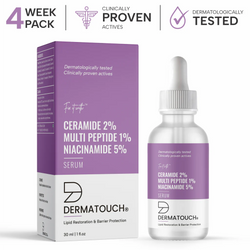
How Stress Affects Your Skin: The Cortisol Connection You Need to Know
Introduction: Why Does Stress Show on Your Face?
Have you ever had a really stressful week and noticed a new pimple pop up? Or your skin looked dry, red, or dull? That’s not just a coincidence it’s your body reacting to stress, and your skin shows the signs first.
In India’s fast-paced life juggling studies, jobs, family, pollution, and travel stress is a daily companion. But very few people realize that emotional stress can hurt our skin, causing acne, dryness, hair fall, and even early wrinkles. Let’s understand how this happens and how to fix it with the right skincare and habits.
What Is Cortisol and Why Does It Affect Skin?
When you feel stressed, your brain activates something called the HPA axis (hypothalamus-pituitary-adrenal). This causes your body to release a hormone called cortisol, also known as the “stress hormone.” While cortisol helps your body deal with tough situations, too much of it over time can harm your skin.
Cortisol affects how your skin protects itself, heals, and even how it looks. Let’s see what it does to your face and body.
1. Your Skin’s Barrier Becomes Weak
Cortisol reduces natural fats in your skin, like ceramides, cholesterol, and fatty acids. These are essential to keep your skin strong and moisturized. Without them, your skin becomes dry, itchy, and more likely to get irritated
2. Pimples and Acne Get Worse
Cortisol makes your body produce more oil (sebum). This extra oil mixes with dirt and dead cells, blocking pores and causing acne. That's why breakouts are common during exams, deadlines, or emotional stress
3. Delayed Healing of Cuts, Acne, or Rashes
When your skin is under stress, it takes longer to heal. This means that acne marks, cuts, and rashes can stick around much longer than usual.
4. Inflammation Flares Up
Skin conditions like eczema, psoriasis, rosacea, and hives often get worse during emotional stress. That’s because cortisol increases inflammation, making your skin overreact.
5. Your Skin May Feel Itchy, Red, or Burn
Even if you don’t have a diagnosed skin condition, stress can cause redness, burning, and itching especially on the cheeks, forehead, and neck.
6. Dark Spots and Uneven Skin Tone
Stress can increase pigmentation, causing your skin to look patchy or uneven. This is because stress slows your skin’s repair and makes it more sensitive to the sun and pollution.
7. Collagen Breaks Down, Leading to Wrinkles
Collagen and elastin are proteins that keep your skin firm. Cortisol breaks these down faster, leading to fine lines, sagging, and early wrinkles even in your 20s!
8. Eyes Show Signs First: Dark Circles and Puffiness
Stress can lead to poor sleep and water retention, making your eyes look tired, puffy, and dark. These are the most visible signs of stress for many people.
9. More Hair Fall and Thinning
High cortisol levels affect hair growth. You might notice increased hair fall, hair thinning, or even patchy loss if you're going through long periods of stress.
10. Your Skin Loses More Water
Stress increases transepidermal water loss (TEWL) which means water escapes faster from your skin. As a result, your skin becomes dull and dehydrated, even if you drink water.
How to Protect and Heal Stressed Skin
The good news? You can protect your skin and help it heal with the right ingredients and habits.
Use These Skin-Soothing Ingredients:
- Ceramides - Rebuild your skin’s natural barrier and prevent moisture loss.
- Peptides - Help skin repair and fight early wrinkles.
- Niacinamide - Reduces redness, inflammation, and oiliness.
- Hyaluronic Acid - Hydrates deeply and strengthens the skin barrier.
- Vitamin C & E -Antioxidants that protect against pollution and brighten the skin.
- Green Tea Extract / Aloe Vera - Naturally calm irritated or red skin.
Look for these in moisturizers, serums, and creams. You don’t need a complicated routine a simple face wash, soothing serum, and a nourishing cream twice a day is enough.
Lifestyle Tips to Help Your Skin (and Mind)
- Get 7-8 hours of sleep- Your skin repairs itself while you sleep.
- Avoid sugar binges during stress-Sugar increases glycation, which breaks collagen.
- Stay hydrated- Water helps flush stress toxins out.
- Try breathing exercises or meditation- It actually helps lower cortisol levels!
- Keep hands off your face- Touching your face during stress spreads bacteria and oil.
Final Thoughts,
In today’s busy world, stress is hard to avoid, but we can manage how it affects our skin. Understanding how cortisol damages your skin helps you take control. Focus on calming ingredients like ceramides, peptides, and niacinamide, and support your skin with sleep, hydration, and gentle care.
Your skin reflects how you feel inside. So, take care of your mind and your skin will thank you.
Suggested Products
View all-
All Skin Type
Kojic Acid 1% Soap
reduce hyperpigmentation4.66
Rs. 149 MRP: Rs. 170 Dermatouch Kojic Acid 1% soap helps to fix your skin from sun & environmental damages while brightening & rejuvenating the skin. The clinic...
View full detailsRs. 149 MRP: Rs. 170 -
Dry Skin
Ceramide 2% Multipeptide 1% Niacinamide 5% Serum
Immediate Hydration4.72
Rs. 350 Dermatouch Ceramide 2% Multi Peptide 1% Niacinamide 5% Serum is a smooth homogeneous formula to help you with skin protection, anti-aging & ev...
View full detailsRs. 350 -
Dry Skin
Ceramide 2% Multi Peptide 1% Niacinamide 5% Serum - 30ml
Immediate Hydration4.71
Rs. 550 Dermatouch Ceramide 2% Multi Peptide 1% Niacinamide 5% Serum is a smooth homogeneous formula to help you with skin protection, anti-aging & ev...
View full detailsRs. 550 -
All Skin Type
Kojic Acid 1% Soap Value Pack
reduce hyperpigmentation4.57
Rs. 272 MRP: Rs. 340 Dermatouch Kojic Acid 1% soap helps to fix your skin from sun & environmental damages while brightening & rejuvenating the skin. The clinic...
View full detailsRs. 272 MRP: Rs. 340





